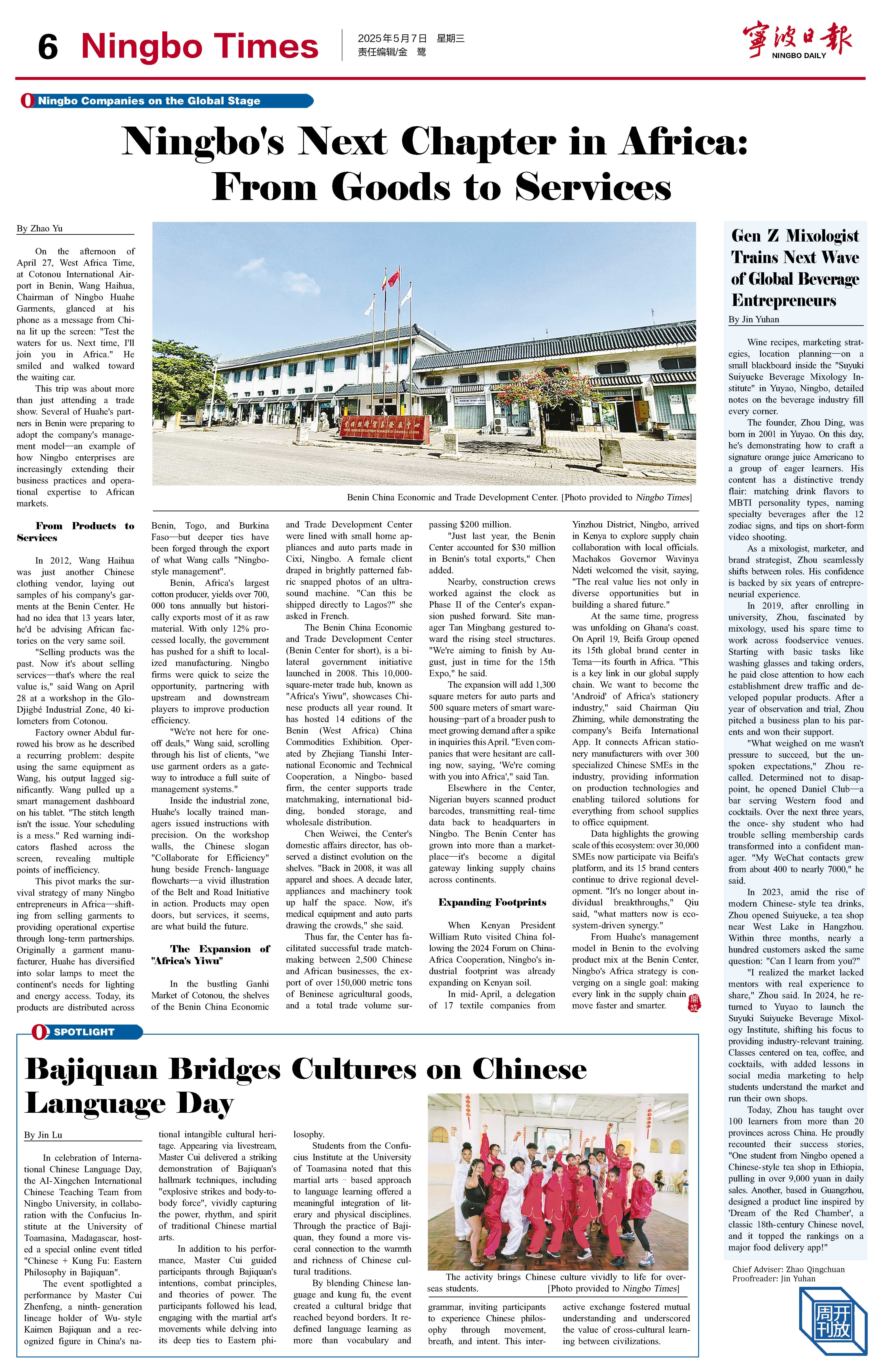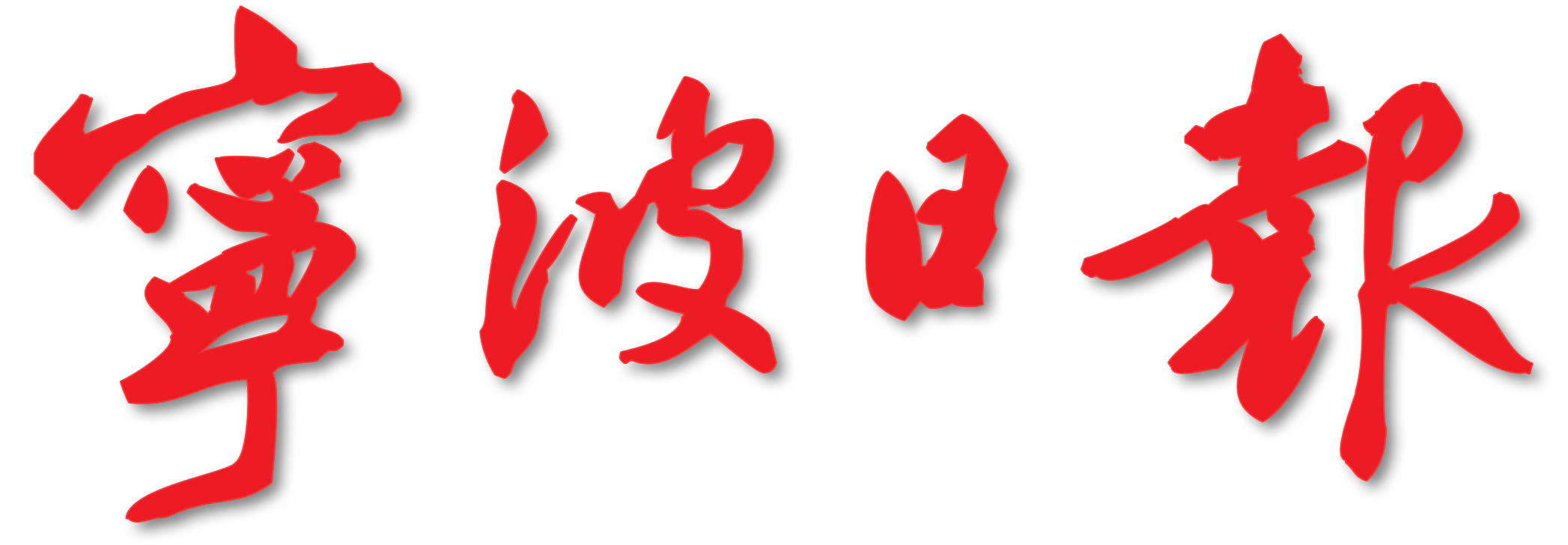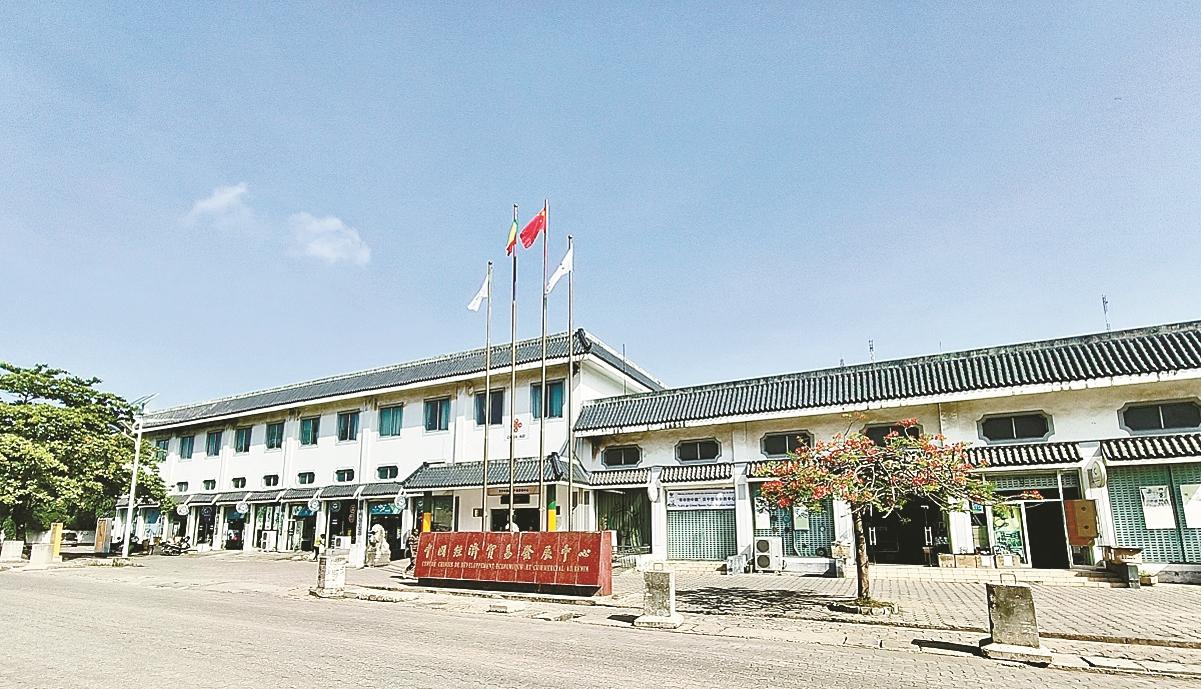By Zhao Yu
On the afternoon of April 27, West Africa Time, at Cotonou International Airport in Benin, Wang Haihua, Chairman of Ningbo Huahe Garments, glanced at his phone as a message from China lit up the screen: "Test the waters for us. Next time, I'll join you in Africa." He smiled and walked toward the waiting car.
This trip was about more than just attending a trade show. Several of Huahe's partners in Benin were preparing to adopt the company's management model—an example of how Ningbo enterprises are increasingly extending their business practices and operational expertise to African markets.
From Products to Services
In 2012, Wang Haihua was just another Chinese clothing vendor, laying out samples of his company's garments at the Benin Center. He had no idea that 13 years later, he'd be advising African factories on the very same soil.
"Selling products was the past. Now it's about selling services—that's where the real value is," said Wang on April 28 at a workshop in the Glo-Djigbé Industrial Zone, 40 kilometers from Cotonou.
Factory owner Abdul furrowed his brow as he described a recurring problem: despite using the same equipment as Wang, his output lagged significantly. Wang pulled up a smart management dashboard on his tablet. "The stitch length isn't the issue. Your scheduling is a mess." Red warning indicators flashed across the screen, revealing multiple points of inefficiency.
This pivot marks the survival strategy of many Ningbo entrepreneurs in Africa—shifting from selling garments to providing operational expertise through long-term partnerships. Originally a garment manufacturer, Huahe has diversified into solar lamps to meet the continent's needs for lighting and energy access. Today, its products are distributed across Benin, Togo, and Burkina Faso—but deeper ties have been forged through the export of what Wang calls "Ningbo-style management".
Benin, Africa's largest cotton producer, yields over 700,000 tons annually but historically exports most of it as raw material. With only 12% processed locally, the government has pushed for a shift to localized manufacturing. Ningbo firms were quick to seize the opportunity, partnering with upstream and downstream players to improve production efficiency.
"We're not here for one-off deals," Wang said, scrolling through his list of clients, "we use garment orders as a gateway to introduce a full suite of management systems."
Inside the industrial zone, Huahe's locally trained managers issued instructions with precision. On the workshop walls, the Chinese slogan "Collaborate for Efficiency" hung beside French-language flowcharts—a vivid illustration of the Belt and Road Initiative in action. Products may open doors, but services, it seems, are what build the future.
The Expansion of "Africa's Yiwu"
In the bustling Ganhi Market of Cotonou, the shelves of the Benin China Economic and Trade Development Center were lined with small home appliances and auto parts made in Cixi, Ningbo. A female client draped in brightly patterned fabric snapped photos of an ultrasound machine. "Can this be shipped directly to Lagos?" she asked in French.
The Benin China Economic and Trade Development Center (Benin Center for short), is a bilateral government initiative launched in 2008. This 10,000-square-meter trade hub, known as "Africa's Yiwu", showcases Chinese products all year round. It has hosted 14 editions of the Benin (West Africa) China Commodities Exhibition. Operated by Zhejiang Tianshi International Economic and Technical Cooperation, a Ningbo-based firm, the center supports trade matchmaking, international bidding, bonded storage, and wholesale distribution.
Chen Weiwei, the Center's domestic affairs director, has observed a distinct evolution on the shelves. "Back in 2008, it was all apparel and shoes. A decade later, appliances and machinery took up half the space. Now, it's medical equipment and auto parts drawing the crowds," she said.
Thus far, the Center has facilitated successful trade matchmaking between 2,500 Chinese and African businesses, the export of over 150,000 metric tons of Beninese agricultural goods, and a total trade volume surpassing $200 million.
"Just last year, the Benin Center accounted for $30 million in Benin's total exports," Chen added.
Nearby, construction crews worked against the clock as Phase II of the Center's expansion pushed forward. Site manager Tan Mingbang gestured toward the rising steel structures. "We're aiming to finish by August, just in time for the 15th Expo," he said.
The expansion will add 1,300 square meters for auto parts and 500 square meters of smart warehousing—part of a broader push to meet growing demand after a spike in inquiries this April. "Even companies that were hesitant are calling now, saying, 'We're coming with you into Africa'," said Tan.
Elsewhere in the Center, Nigerian buyers scanned product barcodes, transmitting real-time data back to headquarters in Ningbo. The Benin Center has grown into more than a marketplace—it's become a digital gateway linking supply chains across continents.
Expanding Footprints
When Kenyan President William Ruto visited China following the 2024 Forum on China-Africa Cooperation, Ningbo's industrial footprint was already expanding on Kenyan soil.
In mid-April, a delegation of 17 textile companies from Yinzhou District, Ningbo, arrived in Kenya to explore supply chain collaboration with local officials. Machakos Governor Wavinya Ndeti welcomed the visit, saying, "The real value lies not only in diverse opportunities but in building a shared future."
At the same time, progress was unfolding on Ghana's coast. On April 19, Beifa Group opened its 15th global brand center in Tema—its fourth in Africa. "This is a key link in our global supply chain. We want to become the 'Android' of Africa's stationery industry," said Chairman Qiu Zhiming, while demonstrating the company's Beifa International App. It connects African stationery manufacturers with over 300 specialized Chinese SMEs in the industry, providing information on production technologies and enabling tailored solutions for everything from school supplies to office equipment.
Data highlights the growing scale of this ecosystem: over 30,000 SMEs now participate via Beifa's platform, and its 15 brand centers continue to drive regional development. "It's no longer about individual breakthroughs," Qiu said, "what matters now is ecosystem-driven synergy."
From Huahe's management model in Benin to the evolving product mix at the Benin Center, Ningbo's Africa strategy is converging on a single goal: making every link in the supply chain move faster and smarter.



